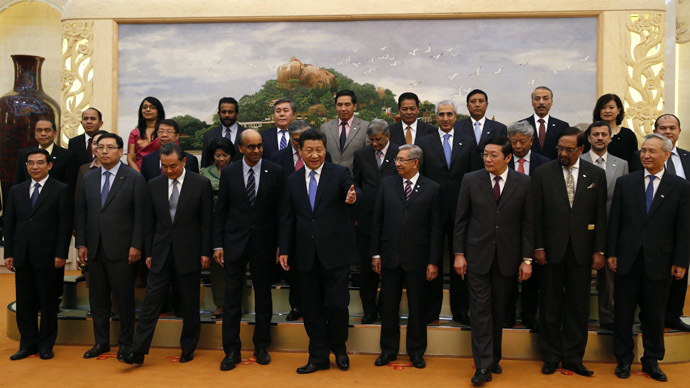Australia ponders ‘vote of confidence’ on joining China-led bank, Japan on fence

Australia has signaled its intention to become a member of the China-led Asian Infrastructure Investment Bank (AIIB) after the UK and EU major members’ decision to join. However, Japan is hesitating over its position.
Canberra shows signs of possible joining, Reuters reported on
Friday, although no formal decision has been made. Australia
rejected China's proposal last year, but is now signaling its
intention to join the bank with an investment of $2.3 billion,
according to Chinese Xinhua news agency. Meanwhile, Japan,
China’s main regional rival, suggested it could become a member
of the institution if certain conditions are met.
After a cabinet meeting on Friday, Finance Minister Taro Aso told
reporters Japan “could consider entering talks” on
joining the AIIB if some of its concerns about lending standards
and the bank’s governance were addressed, the Financial Times
says. Japan is hesitant to join the China-led bank over its
relations with Washington and over the AIIB's potential rivalry
with the Asian Development Bank.
"Views are split within the Japanese government on whether to join the AIIB,"a person with close knowledge of Japan's financial policy-making was cited as saying by Reuters.
Considering the standoff within the government of Japan, the
country’s participation "is not going to happen under the Abe
administration,” according to a senior official in the
ruling coalition.
READ MORE: France, Germany, Italy to join
China-led $50bn infrastructure bank
The possible move comes after EU major members France, Germany
and Italy confirmed on Tuesday they will become founding AIIB
members in the wake of Britain's application last week. This is
despite the increasing pressure and negative reaction from the
United States.
While the new China-led bank is expected to challenge the Western dominance of the US-led World
Bank and the IMF, Washington expressed concerns that the new
investment bank might not have high enough standards of
governance and environmental and social safeguards.
The AIIB is also a potential rival of the Asian Development Bank
(ADB), the Manila-based multilateral institution dominated by
Japan and the United States. The new bank can amount to diminish
the Japanese influence in favor of China in the Asia Pacific
region.
After the collapse of Soviet Union the United States as a single
superpower with the IMF and the World Bank at its disposal used
those institutions as a way to help its own operations and did
not help people from other countries, chief economist at a major
international consulting firm John Perkins, who has advised the
World Bank, UN, IMF, and US Treasury Department, told the Sputnik
Radio.
“China’s stepping in to offer an alternative now and much of
the rest of the world welcome this opportunity. It’s a real shift
in financial power now around the globe,” Perkins added.
Meanwhile, South Korea is reportedly ready to announce its entry
to the AIIB in the near future, Xinhua reported. Switzerland and
Luxembourg are also considering joining. Twenty-seven countries
had applied to jointly build the bank as founding members. The
application deadline is March 31.
With an expected initial subscribed capital of $50 billion, the
AIIB will be an international financial institution to fund
infrastructure projects in Asia and is expected to be formally
established by the end of this year.












